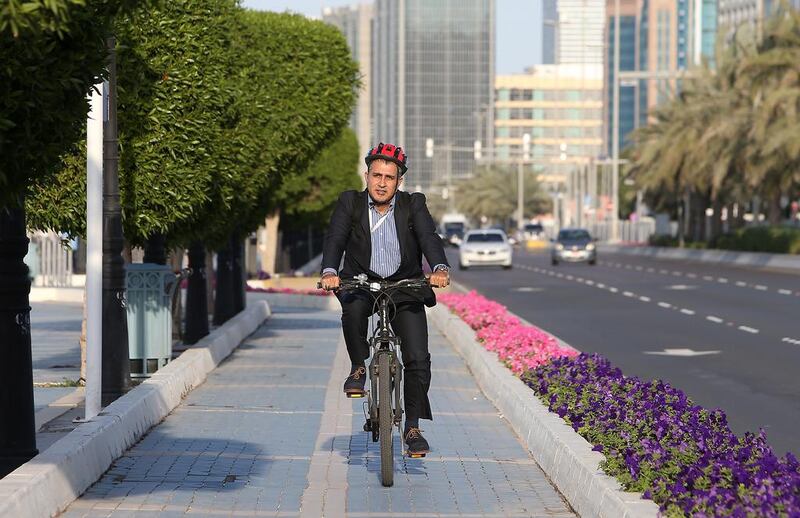ABU DHABI // Cycling to work is more than just a lifestyle, it is a statement.
That is the view of Abu Dhabi resident Rami Eljundi. As one of the few Arabs commuting to work on a bicycle, he said he has been mocked and singled out by Arab colleagues and friends for years.
“One of my friends went as far as accusing me of showing off,” said the Jordanian expat, who works in corporate communications in the energy sector.
The idea to trade his car for a bicycle for his journey to and from work first came to him after renting a bike on the Corniche four years ago.
“It reminded me of the joy of biking as a child in Qatar and as a university student in Texas and I thought ‘why can’t I ride to work right here in a suit’.”
The sight of Mr Eljundi cycling to work in a suit raised eyebrows in the streets and he encountered resistance in the office.
“I would receive funny comments such as ‘Man, what are you trying to do?’ and ‘Why don’t you come to work in a car like the rest of us’,” said Mr Eljundi.
Even those who did compliment him did it quietly, in private. “They would grab me in the car park and tell me what I was doing was a great thing.
“I would tell them it was really nice but why didn’t they have the guts to tell me in the lobby in front of others and they would just start to laugh.”
Attitudes at work towards Mr Eljundi’s seemingly peculiar means of transport shifted in 2014 after one of the company’s directors recognised his efforts by awarding him with a plaque and gift certificate for being the “ideal employee for the environment and sustainability”.
Despite the award, Mr Eljundi said that he still has not come across one other Arab who commutes to work by bike. “The Arab community has to stop seeing cycling as just a fun weekend activity for children and always associating it as a means of transport only for the poor and working class.
“Why can’t it be connected with educated people, with those in suits, with professional people?” he said.
Mr Eljundi takes his role as an Arab bicycle ambassador seriously but often delivers his message in a light-hearted manner. This included queuing on his bicycle in a line of cars outside the entrance of a hotel where his company was holding a meeting. “I waited my turn in my suit, on my bike, and when I got to the front I looked around and asked ‘Is no one going to valet my bicycle?’”
To try to change the perception of cycling in the Arab community he tells others of the numerous benefits. “You have to talk their language. When people talk to me about not having time for the gym I say that by cycling to work you’ll get daily exercise. When they talk about saving money I tell them I barely put 6,000 kilometres on my car a year.”
Another merit of opting for two wheels instead of four include greater interaction with members of the community. “You start to see the same people jogging or walking in the morning and we wave, smile and talk to each other. You become embedded in the community, this would never happen if we were in our cars.”
tsubaihi@thenational.ae





